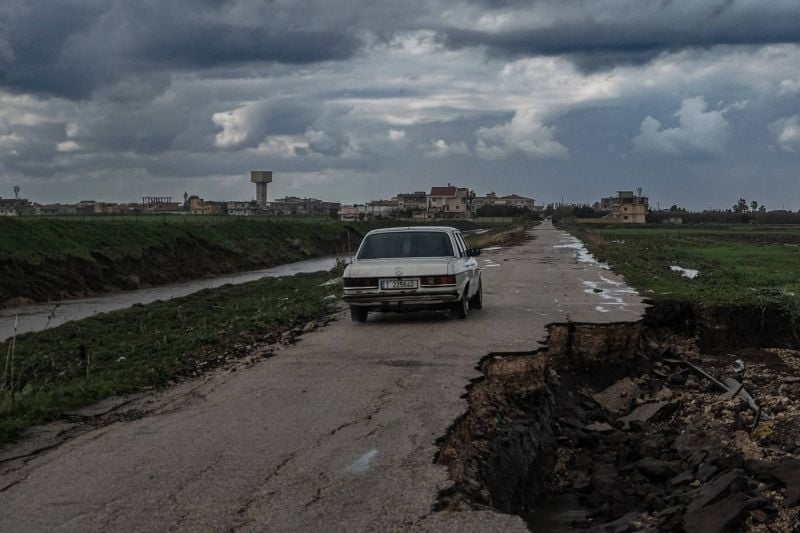
A damaged road in the rural Akkar governorate village of Summaqieh after a heavy rainstorm caused floods. Jan. 15, 2024. (Credit: João Sousa/L'Orient Today)
It would be understandable for Lebanon’s residents to say that the country is hell for motorists, who spend hours every day in their vehicles. Poorly lit roads, potholes, flooding, lack of traffic controls, driving licenses readily made, risky driving and cars without plate numbers, all combine to make road traffic particularly stressful and risky.
Does this make Lebanon the most dangerous country in the world for drivers?
This was suggested by a study published on Jan. 11 by Global Positioning Specialists (GPS) — a company offering comparative GPS for vehicles, whose offices are in England, said its website, although the latter’ s extension is Australian gps.com.au.
“The most dangerous countries to be a driver” ranked Lebanon at the top, ahead of Uruguay, Colombia, Costa Rica and Greece. The study is based on three factors: The number of fatal accidents per inhabitant, where Lebanon is ranked 6th, the number of vehicle thefts per inhabitant (10th) and the road quality (4th).
Seen by more than 750,000 Internet users, the top 10, posted on the X (formerly Twitter) account of World Index, which publishes world rankings in various fields, caused reactions, varying between humor and bitterness. “Always at the top,” wrote an X user, adding a Lebanese flag in the tweet. “In Lebanon, people consider that using a seatbelt or stopping at a red light are signs of weakness,” wrote another.
The ranking was also reported by a number of media outlets, including The961 and MTV.
But in the comments, some asked, what about India, Bangladesh or Egypt? One went even further asking whether “Syria should be No. 1?”
The GPS ranking simply examined data from 60 countries, i.e. 30.7 percent of the 195 countries in the world, mentioning the countries most dependent on cars, without specifying the criteria used.
L’Orient-Le Jour could not learn more; the e-mail address of the GPS press contact does not work…
In the MENA region, only Algeria, in 19th place, and the United Arab Emirates, in 57th place, are present. So, we don't know whether the Lebanese or Yemeni driver has it worst.
In addition to this glaring lack of representation, others question the scientific nature of the study. For example, one Internet user felt that it would be more accurate to divide the number of fatal accidents by the number of kilometers traveled by drivers, rather than by the number of inhabitants.
Worse still, the data used for this ranking date back to eight years ago. In fact, GPS cited three sources: The Travel & Tourism competitiveness report 2015, the World Health Organization’s (WHO) report on global road safety published the same year and the UN Office on Drug and Crimes’ 2014 statistics on theft.
Speaking to L’Orient-Le Jour, Internal Security Forces (ISF) Colonel Joseph Moussallem expressed serious doubts about the figures put forward. “In 2023, 1,147 cars were stolen in Lebanon. Yet the report talks about 179.2 stolen vehicles per 100,000 inhabitants. If you do the math, there’s a huge difference,” he said.
Out of a Lebanese population now estimated at 5.2 million by the global barometer, based on UN data, this would be equivalent to 9,318 thefts across the country.
With regard to road accidents, Moussalem said 381 deaths were recorded by the ISF in 2023. The GPS study, meanwhile, spoke of 22.6 deaths per 100,000 inhabitants, which would be equivalent to 1,175 road deaths.
Admittedly, the WHO recently stated that the number of road deaths recorded in Lebanon was “at least 80 percent incomplete,” and even estimated that the actual number was twice as high. But this is still well below the figure given in the GPS rankings.
As for the state of the road infrastructure, it is undoubtedly in a state of decay. Former manager of the Traffic Management Center (TMC), a body that supervised Lebanese traffic through its surveillance cameras, Jean Dabagh, who is now based in Toronto, said that “90 percent of the cameras are shut down, while the traffic lights are now operating virtually maintenance-free since TMC ceased operating in October 2020.”
At the time, however, he warned in our columns that “without maintenance, malfunctions are expected; without funding, no repairs are possible.”
Since then, he said that some municipalities are taking the initiative to carry out local maintenance, while the ISF are doing their best, albeit with limited resources, to supervise traffic.
Probably not the worst country in the world to be a driver, Lebanon is undoubtedly exigent for motorists and pedestrians alike.
This article was originally published in L'Orient-Le Jour. Translated by Joelle El Khoury.
